Abstract
BACKGROUND--The reliability of information collected from close acquaintances of the deceased in studies on mortality from asthma has not been assessed. As part of a South Australian asthma mortality study, levels of agreement for information obtained directly from cases--that is, cases who had experienced near fatal asthma attacks--were compared with corresponding information concerning these cases obtained independently from close acquaintances. METHODS--The first 51 subjects presenting from the outset of the main study to hospital accident and emergency departments with near fatal asthma attacks were included to gain an early assessment of the reliability of responses. The level of agreement between self reported information and that obtained from close acquaintances was compared by means of a kappa statistic or intraclass correlation coefficient, depending on the measurement scale. Both score one for complete agreement and zero when there is no agreement. RESULTS--High levels of agreement were found for questions relating to use of hospital services, with agreement levels ranging from 0.92 for visits in the past month to accident and emergency departments, to 0.86 for prior hospital admissions and 0.78 for prior need for assisted ventilation. Levels of agreement for drug treatment ranged from 1.00 for use of beta agonists to 0.64 for corticosteroid use, and to a low 0.24 for use of sodium cromoglycate. There was moderate agreement for histories of regular use of over the counter medications without a medical consultation (0.57). Psychiatric characteristics showed moderate levels of agreement, with values of 0.44 for personal history of psychiatric consultations and 0.50 for denial score. Agreement scores were 0.66 for doctor visits in the past month, 0.66 for limitations in daily activities, 0.76 for loss of work days in the past month, 0.59 for severity of asthma, and 0.55 for frequency of asthma attacks in the past month. Poorer agreement scores were found for trends in asthma symptoms (0.21) and frequency of symptoms during the past three years (0.12). Sleep disturbance was also associated with a low agreement score (0.25). CONCLUSIONS--The more visible the asthma manifestation, and the more recent the period to which it applies, the more reliable is the information provided by close acquaintances. These factors need to be taken into account when using information from close acquaintances in asthma mortality studies.
Full text
PDF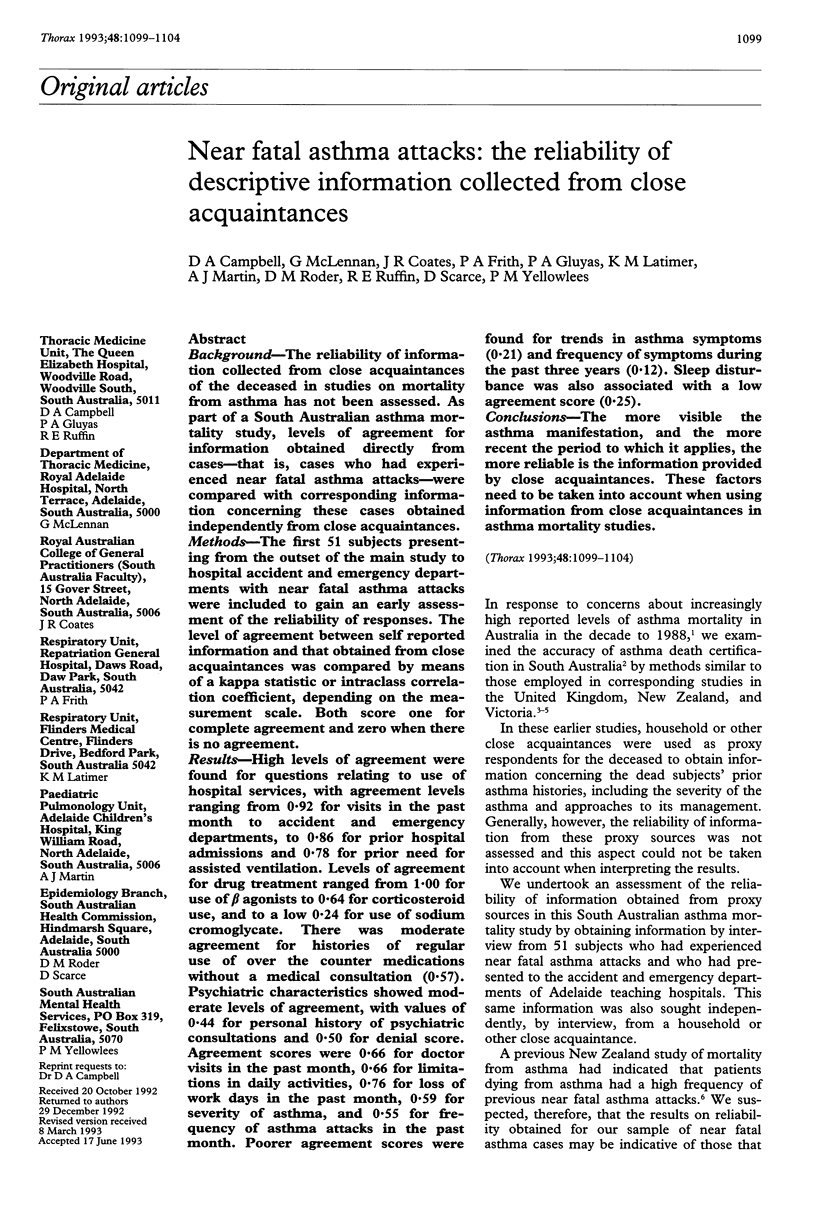
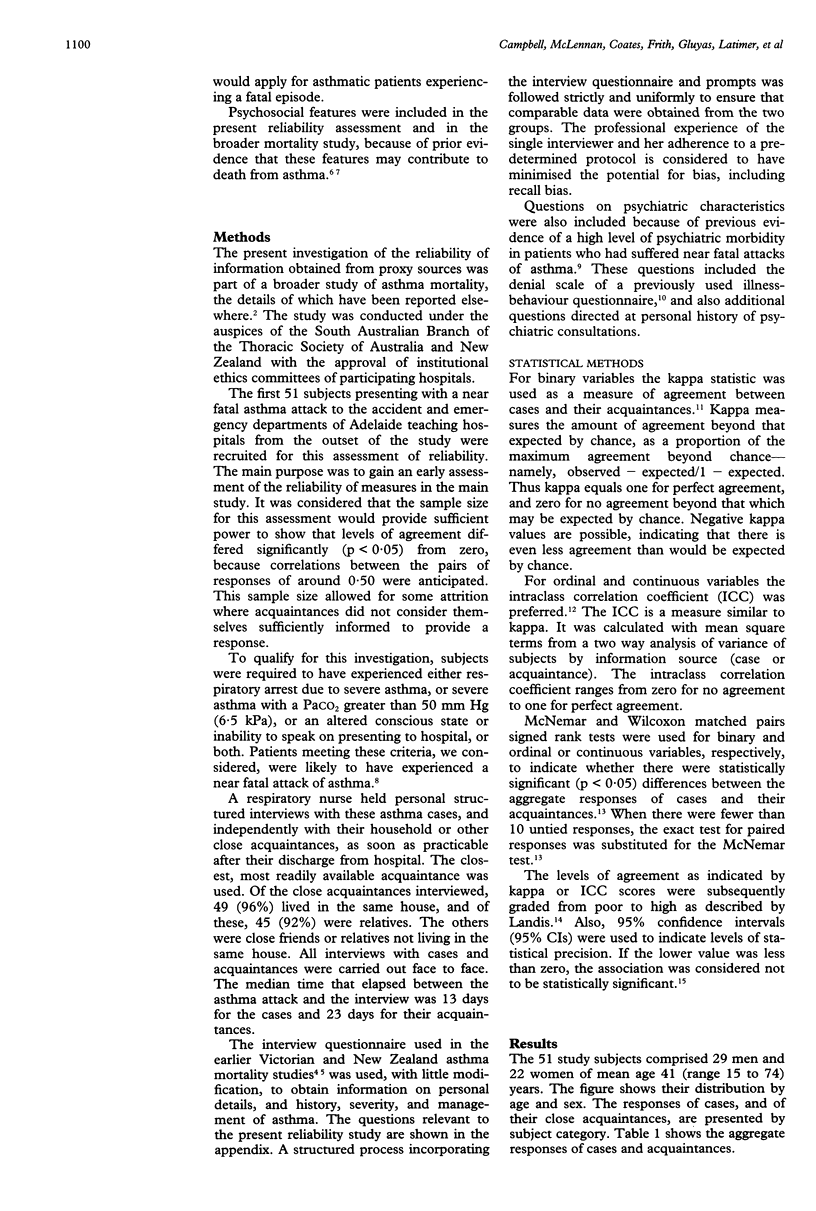
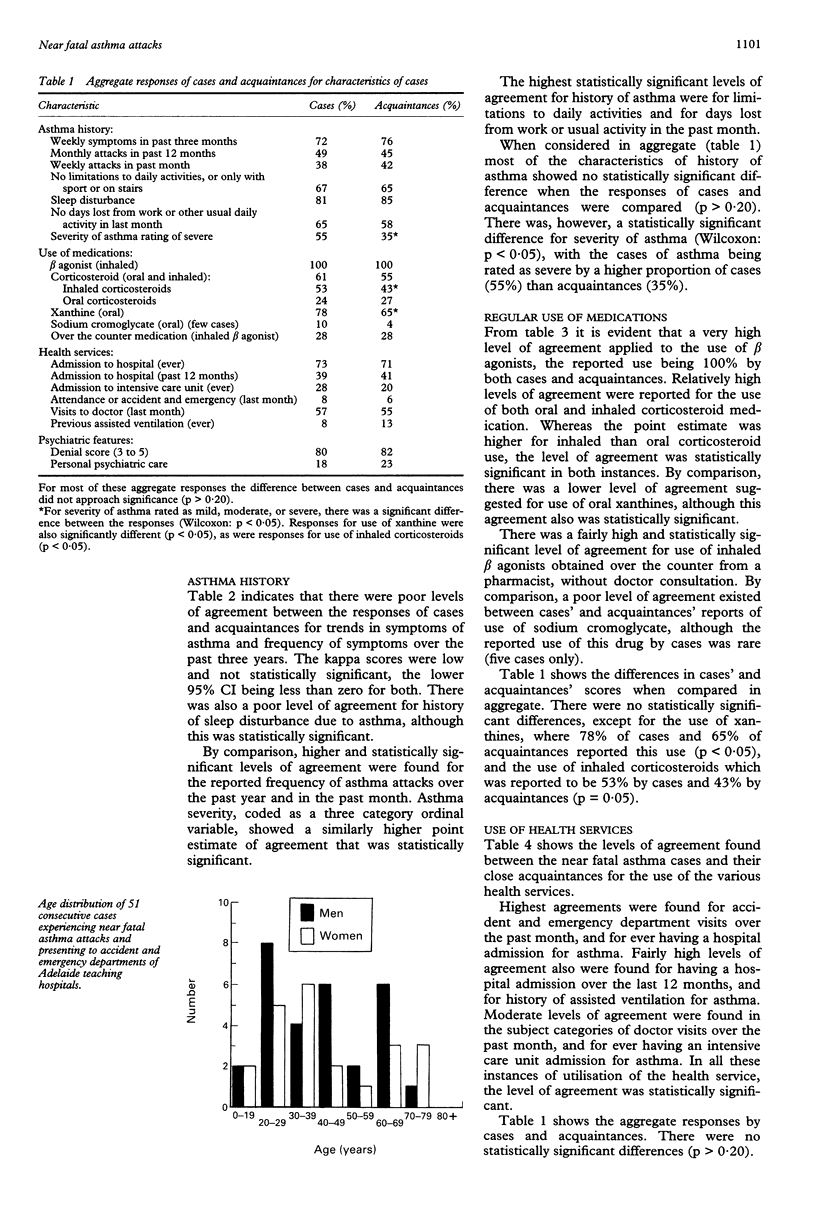
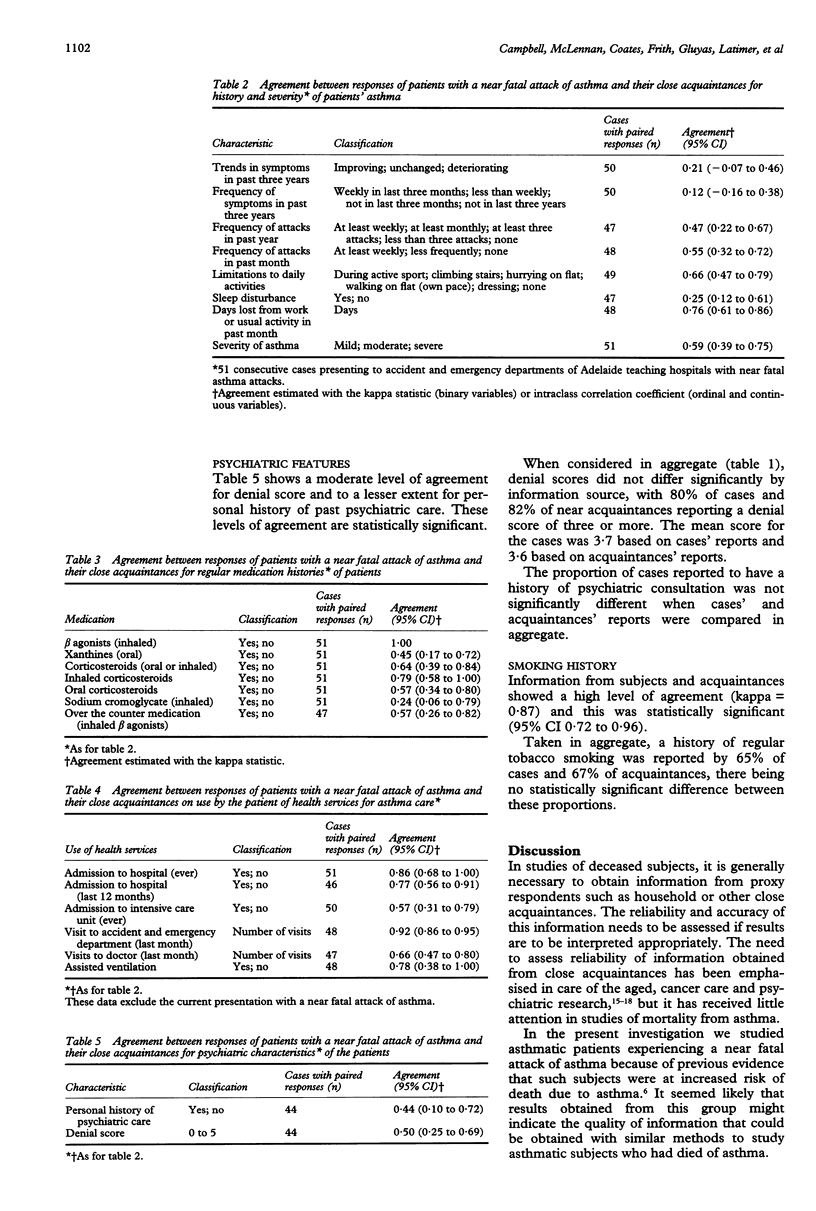
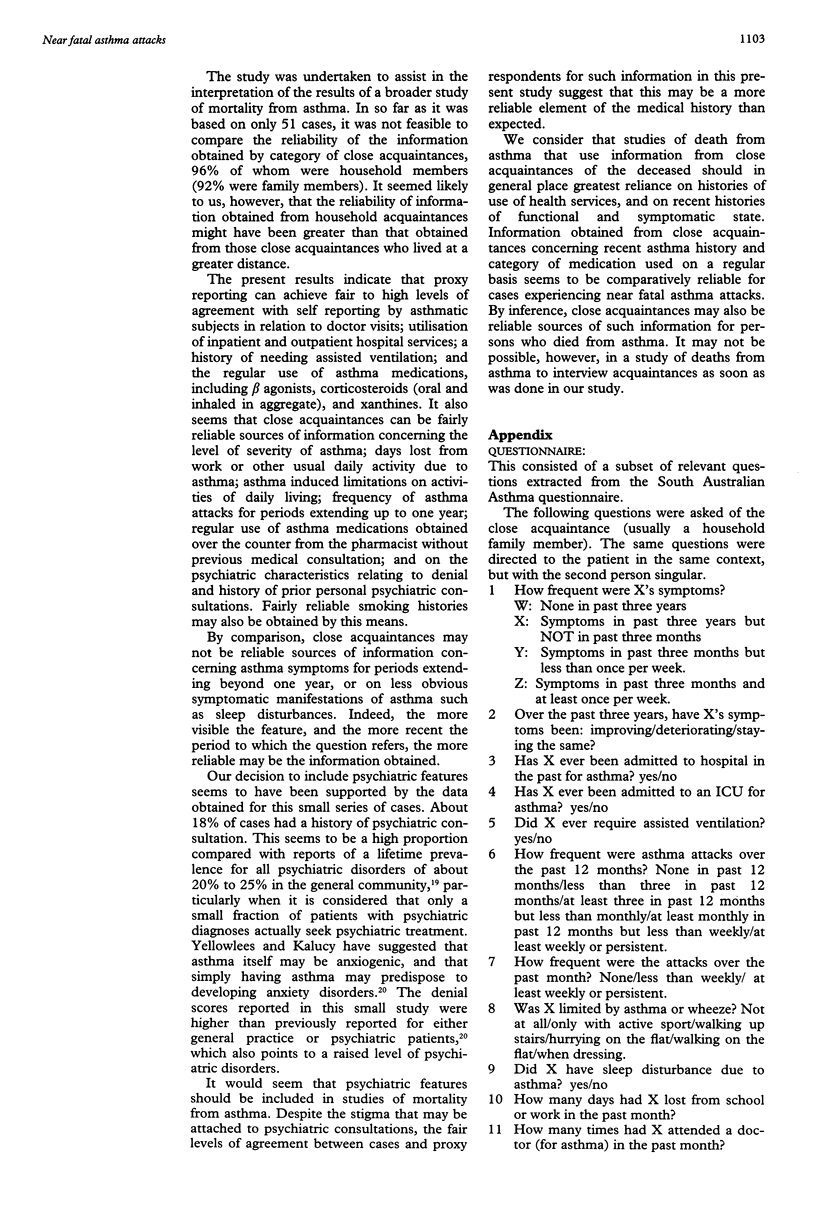
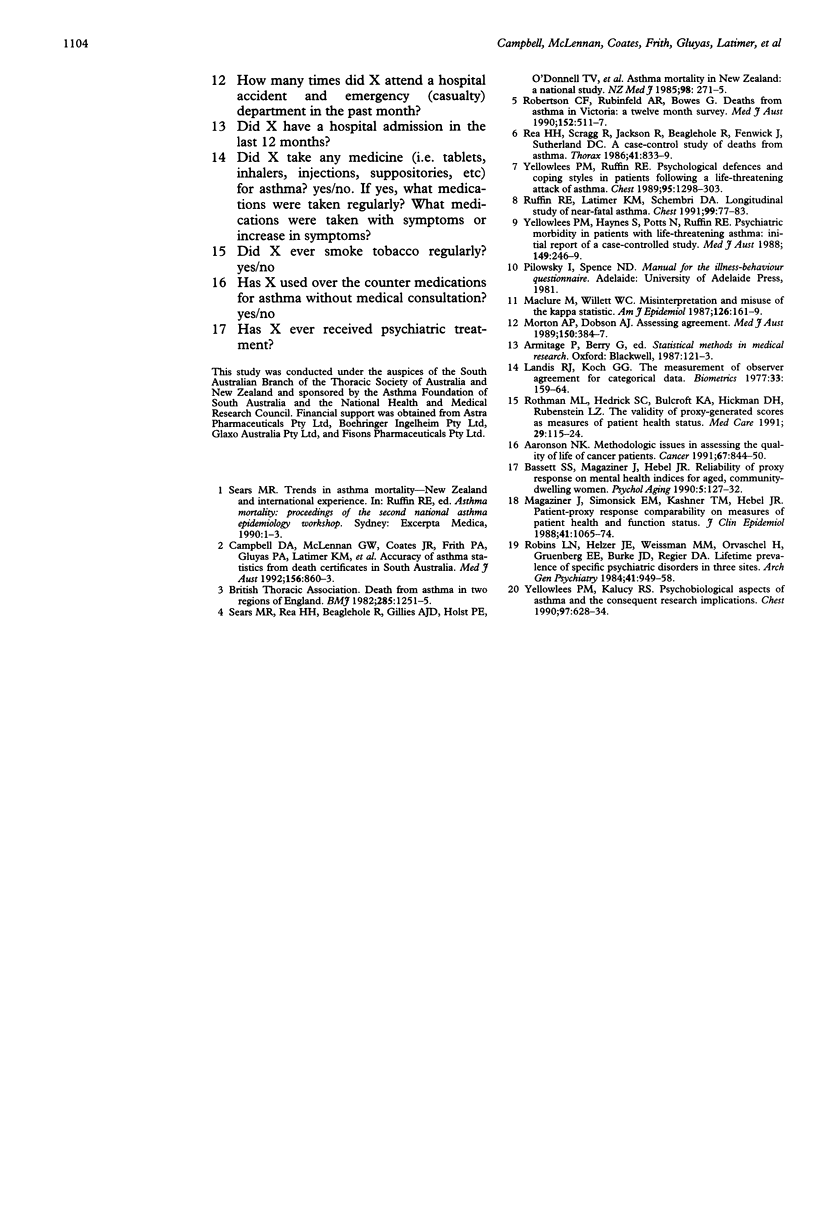
Selected References
These references are in PubMed. This may not be the complete list of references from this article.
- Aaronson N. K. Methodologic issues in assessing the quality of life of cancer patients. Cancer. 1991 Feb 1;67(3 Suppl):844–850. doi: 10.1002/1097-0142(19910201)67:3+<844::aid-cncr2820671416>3.0.co;2-b. [DOI] [PubMed] [Google Scholar]
- Bassett S. S., Magaziner J., Hebel J. R. Reliability of proxy response on mental health indices for aged, community-dwelling women. Psychol Aging. 1990 Mar;5(1):127–132. doi: 10.1037//0882-7974.5.1.127. [DOI] [PubMed] [Google Scholar]
- Campbell D. A., McLennan G., Coates J. R., Frith P. A., Gluyas P. A., Latimer K. M., Martin A. J., Roder D. M., Ruffin R. E., Yellowlees P. M. Accuracy of asthma statistics from death certificates in South Australia. Med J Aust. 1992 Jun 15;156(12):860–863. doi: 10.5694/j.1326-5377.1992.tb137000.x. [DOI] [PubMed] [Google Scholar]
- Landis J. R., Koch G. G. The measurement of observer agreement for categorical data. Biometrics. 1977 Mar;33(1):159–174. [PubMed] [Google Scholar]
- Maclure M., Willett W. C. Misinterpretation and misuse of the kappa statistic. Am J Epidemiol. 1987 Aug;126(2):161–169. doi: 10.1093/aje/126.2.161. [DOI] [PubMed] [Google Scholar]
- Magaziner J., Simonsick E. M., Kashner T. M., Hebel J. R. Patient-proxy response comparability on measures of patient health and functional status. J Clin Epidemiol. 1988;41(11):1065–1074. doi: 10.1016/0895-4356(88)90076-5. [DOI] [PubMed] [Google Scholar]
- Morton A. P., Dobson A. J. Assessing agreement. Med J Aust. 1989 Apr 3;150(7):384–387. doi: 10.5694/j.1326-5377.1989.tb136531.x. [DOI] [PubMed] [Google Scholar]
- Rea H. H., Scragg R., Jackson R., Beaglehole R., Fenwick J., Sutherland D. C. A case-control study of deaths from asthma. Thorax. 1986 Nov;41(11):833–839. doi: 10.1136/thx.41.11.833. [DOI] [PMC free article] [PubMed] [Google Scholar]
- Robins L. N., Helzer J. E., Weissman M. M., Orvaschel H., Gruenberg E., Burke J. D., Jr, Regier D. A. Lifetime prevalence of specific psychiatric disorders in three sites. Arch Gen Psychiatry. 1984 Oct;41(10):949–958. doi: 10.1001/archpsyc.1984.01790210031005. [DOI] [PubMed] [Google Scholar]
- Rothman M. L., Hedrick S. C., Bulcroft K. A., Hickam D. H., Rubenstein L. Z. The validity of proxy-generated scores as measures of patient health status. Med Care. 1991 Feb;29(2):115–124. doi: 10.1097/00005650-199102000-00004. [DOI] [PubMed] [Google Scholar]
- Ruffin R. E., Latimer K. M., Schembri D. A. Longitudinal study of near fatal asthma. Chest. 1991 Jan;99(1):77–83. doi: 10.1378/chest.99.1.77. [DOI] [PubMed] [Google Scholar]
- Sears M. R., Rea H. H., Beaglehole R., Gillies A. J., Holst P. E., O'Donnell T. V., Rothwell R. P., Sutherland D. C. Asthma mortality in New Zealand: a two year national study. N Z Med J. 1985 Apr 24;98(777):271–275. [PubMed] [Google Scholar]
- Yellowlees P. M., Haynes S., Potts N., Ruffin R. E. Psychiatric morbidity in patients with life-threatening asthma: initial report of a controlled study. Med J Aust. 1988 Sep 5;149(5):246–249. doi: 10.5694/j.1326-5377.1988.tb120596.x. [DOI] [PubMed] [Google Scholar]
- Yellowlees P. M., Kalucy R. S. Psychobiological aspects of asthma and the consequent research implications. Chest. 1990 Mar;97(3):628–634. doi: 10.1378/chest.97.3.628. [DOI] [PubMed] [Google Scholar]
- Yellowlees P. M., Ruffin R. E. Psychological defenses and coping styles in patients following a life-threatening attack of asthma. Chest. 1989 Jun;95(6):1298–1303. doi: 10.1378/chest.95.6.1298. [DOI] [PubMed] [Google Scholar]



